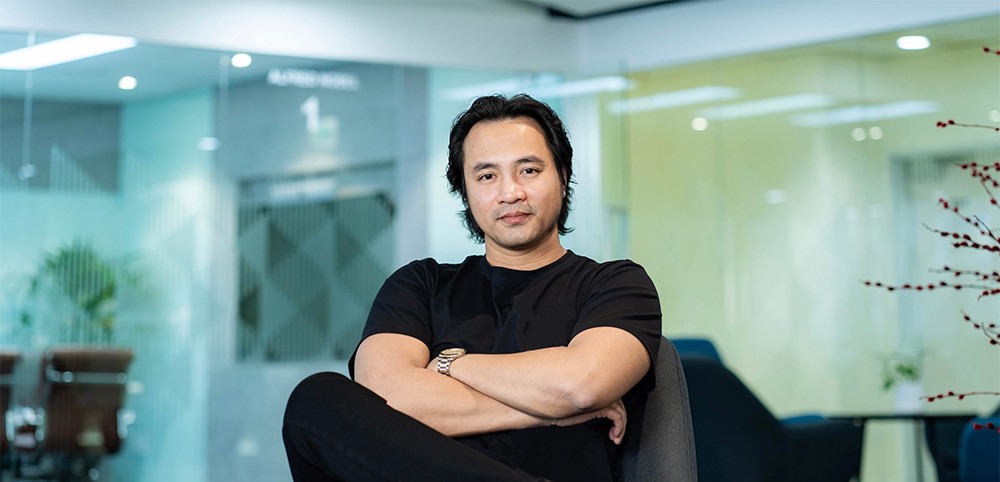Mr. Phan Duc Nhat's sharing about the impact and challenges of AI for Vietnam
Mr. Phan Duc Nhat, Chairman of Coin.Help & BHO Network, pointed out that AI is not only the technology of the future but also the key to opening up development opportunities for Vietnam.
Before we begin, please introduce yourself and your current job!
Phan Duc Nhat: Hello, I am Phan Duc Nhat, currently the Chairman of Coin.Help & BHO Network, an organization that supports projects in the fields of Web3, Blockchain and AI.

Mr. Phan Duc Nhat - Chairman of Coin.Help & BHO Network
Sir, could you tell us what opportunities AI is bringing to Vietnam?
Phan Duc Nhat: First, AI automation helps reduce errors and improve productivity in manufacturing, services and agriculture.
In healthcare, AI applications help doctors and medical staff diagnose diseases, detect them early, and treat them more effectively.
In education, AI helps personalize the learning process, improving the quality of teaching for students.
AI also promotes the development of smart cities, supports traffic management, improves quality of life and saves energy.
AI also opens up many opportunities for startups and innovation, helping companies develop new products and services, boosting economic growth and creating more jobs.
AI is posing many challenges. Can you share about these challenges?
Phan Duc Nhat: One of the biggest challenges is job loss due to automation, especially in low-skilled occupations.
The next challenge is the skills shortage. The development of AI requires the workforce to have new skills, while training and developing human resources to meet this demand is still difficult.
Management is also a big challenge. The rapid development of AI surpasses the management and regulation capabilities of current laws.
Another issue is bias and discrimination. If the AI training data contains bias, it will lead to unfair, discriminatory decisions.
Additionally, the collection and analysis of personal data can be an invasion of privacy if not managed carefully.
AI can also be hacked and abused for malicious purposes.
According to you, what measures does Vietnam need to take to successfully integrate into the AI era?
Phan Duc Nhat: To successfully integrate into the AI era, Vietnam needs to implement many strategic and comprehensive measures. First, it is necessary to invest heavily in education and training. Build and update educational programs focusing on digital skills, programming and AI. At the same time, expand vocational training courses and lifelong learning on AI so that workers can update their knowledge and skills.
More AI research labs and innovation centers need to be built. High-tech infrastructure such as 5G networks, cloud computing, and data centers need to be developed to support AI research and deployment.
Strengthen cooperation, participate in international forums on AI to improve understanding and expand the network of relationships. Create policies and financial support to encourage businesses to apply and develop AI.
At the same time, it is necessary to build a clear legal framework to manage and monitor the use of AI, ensuring security, transparency, responsibility and people's privacy.
Finally, it is necessary to raise public awareness about the benefits and challenges of AI so that people understand and are ready to accept new technology.
What should Vietnamese businesses do to save costs and human resources when wanting to develop AI, sir?
Phan Duc Nhat: To save money, businesses can use available AI platforms such as Microsoft Azure, Google Cloud AI, AWS AI Services. These platforms provide powerful AI services and are easy to integrate into business processes.
Partnering with tech companies and AI startups is another way to save costs and leverage expertise instead of developing in-house.
Internal training is also important. Businesses should invest in training their current employees so that they can master AI knowledge and skills. This not only saves on new recruitment costs but also makes use of existing human resources.
Implement AI in small phases before scaling up. This way, businesses can manage risk and ensure that AI projects deliver real value.
When implementing, businesses need to focus on evaluating the return on investment (ROI). Choose AI projects that are likely to bring the greatest value and focus resources on these projects.
In addition, businesses can seek financial support from the government, investment funds and startup support programs to develop AI projects.
Thank you for your very useful and detailed sharing. Hopefully this information will help businesses and individuals in Vietnam grasp opportunities and overcome challenges in the AI era.

Saved post successfully
You can review saved articles on the Saved Articles page.
Agree